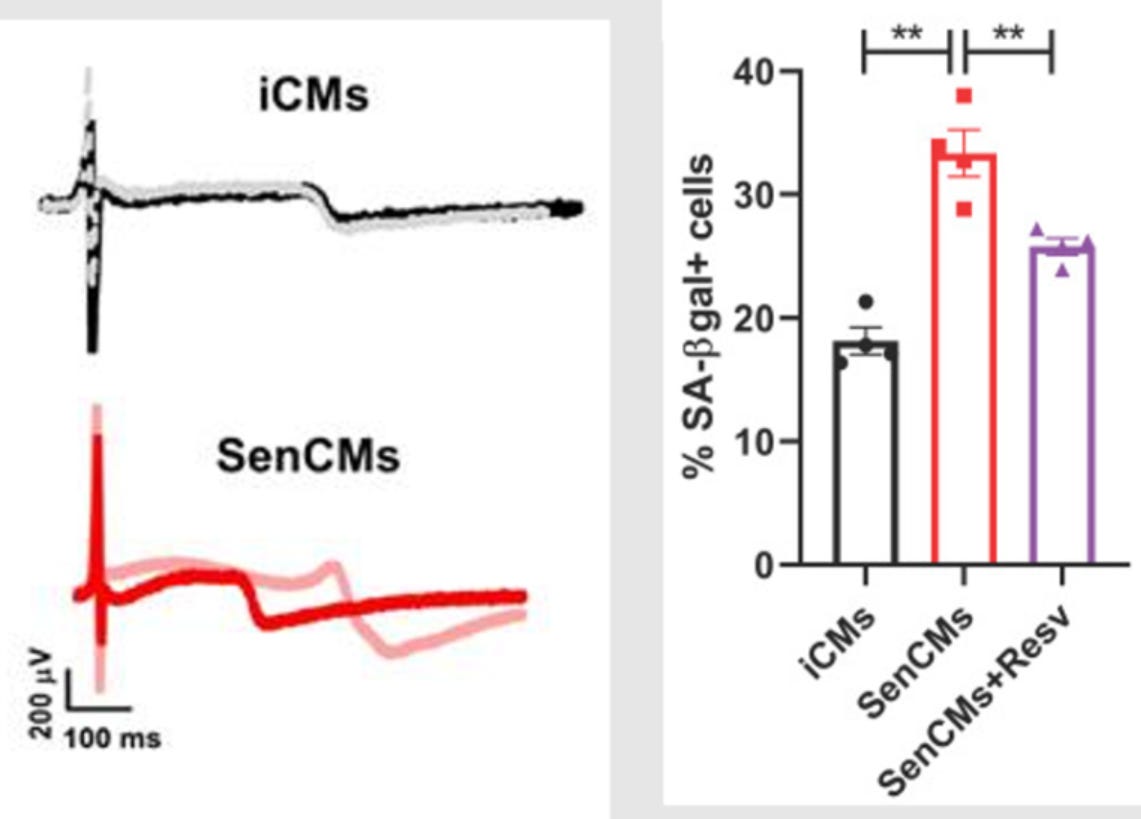Friday Hope: Resveratrol: A Radiation Protector and So Much More
A ROS Scavenger and Senomorphic Weapon Against SARS-CoV-2 and the Spike Protein
Resveratrol Reduces Signs of Aging. Compared to unstressed CMs (iCMs), aged CMs (SenCMs) have abnormal heart rhythms (left). Resveratrol reduces the percentage of senescent cells (SA-β gal) amongst aged cells (SenCMs + Resv).
Study Shows Resveratrol Slows Cardiac Aging via Senolytic Function
https://www.nmn.com/news/resveratrol-cardiac-aging-zombie-cell-elimination
If you have been following my work for the past three years, you will know that overwhelming evidence has been found that SARS-CoV-2 infection and its Spike Protein induce the production of Reactive Oxygen Species and induces Senescence in cells. It is important to find natural, safe therapeutics which can be used to effectively mitigate the damage caused by the virus and its proteins. Resveratrol is almost certainly one of the best as it works against both Reactive Oxygen Species (ROS) and Senescence.
First, let us look at how Resveratrol behaves as a ROS scavenger.
In 2003 it was found that Resveratrol not only scavenges ROS, but also mitigates the effects that ROS have on the cell itself.
The present study measured the effect of resveratrol on several different systems involving the hydroxyl, superoxide, metal/enzymatic-induced, and cellular generated radicals. The rate constant for reaction of resveratrol with the hydroxyl radical was determined, and resveratrol was found to be an effective scavenger of hydroxyl, superoxide, and metal-induced radicals as well as showing antioxidant abilities in cells producing ROS. Resveratrol exhibits a protective effect against lipid peroxidation in cell membranes and DNA damage caused by ROS. Resveratrol was also found to have a significant inhibitory effect on the NF-kappaB signaling pathway after cellular exposure to metal-induced radicals. It was concluded that resveratrol in foods plays an important antioxidant role.
Resveratrol scavenges reactive oxygen species and effects radical-induced cellular responses
https://pubmed.ncbi.nlm.nih.gov/13679076/
Resveratrol is also a Senomorphic. This means it has the ability to PREVENT the formation of Senescent cells – it helps to keep your cells in a live, healthy and active state. Interestingly, this only occurs with a low dose. High doses of Resveratrol actually INDUCE senescence, which is not what we want in this case.
Despite its various health benefits, SIRT1 activator resveratrol has a biphasic effect on cellular senescence. At low concentrations (usually below 10 μM), resveratrol is a senomorphic or antioxidant able to prevent cellular senescence and suppress SASPs. For example, resveratrol was shown to prevent cellular senescence of endothelial progenitor cells by activation of telomerase through the PI3K-Akt signalling pathway and alleviate senescence in neural cells via activation of SIRT1-mediated STAT3 signalling. It was also shown to inhibit cellular senescence of human bone marrow stromal stem cells and suppress SASP factors by inhibiting NF-κB and up-regulating Nrf2 pathways in vascular smooth muscle cells from aged rhesus monkeys. However, at higher concentrations (typically over 25 μM), resveratrol acts as a pro-oxidant triggering growth arrest and induction of senescence and/or apoptotic death in multiple cell lines.
Targeting cellular senescence with senotherapeutics: senolytics and senomorphics
https://febs.onlinelibrary.wiley.com/doi/10.1111/febs.16350
Perhaps the most remarkable discovery related to Resveratrol and the Spike Protein is how Resveratrol is a strong therapeutic against Radiation damage and injury, which the Spike Protein mimics PERFECTLY.
This is amazing, please note how it regulates p53 expression!
Compared to the vehicle control, treatment with resveratrol improved intestinal morphology, decreased apoptosis of crypt cells, maintained cell regeneration, and ameliorated SOD2 expression and activity. Resveratrol also regulated Sirt1 and acetylated p53 expression perturbed by irradiation in the small intestine. The protective effect of resveratrol against ionizing radiation induced small intestine injury was significantly inhibited by Ex527.
The protective effects of Resveratrol against radiation-induced intestinal injury
https://www.ncbi.nlm.nih.gov/pmc/articles/PMC5559783/
And yes, Resveratrol has been shown to be effective against acute SARS-CoV-2 infection itself.
Twenty-one-day outcome was determined of all one hundred participants (mean [SD] age 55.6 [8.8] years; 61% female). There were no clinically significant adverse events attributed to resveratrol. Outpatients in this phase 2 study treated with resveratrol had a lower incidence compared to placebo of: hospitalization (2% vs. 6%, RR 0.33, 95% CI 0.04–3.10), COVID-19 related ER visits (8% vs. 14%, RR 0.57, 95% CI 0.18–1.83), and pneumonia (8% vs. 16%, RR 0.5, 95% CI 0.16–1.55).
Randomized double-blind placebo-controlled proof-of-concept trial of resveratrol for outpatient treatment of mild coronavirus disease (COVID-19)
https://www.nature.com/articles/s41598-022-13920-9
I believe Resveratrol will prove to be a very powerful, safe and effective therapeutic against most of the pathology of the SARS-CoV-2 virus and its Spike Protein.




Red, red wine.
Hi Walter -- How would people know what dose to take?